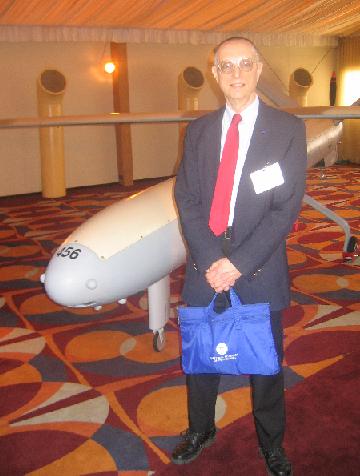Prof. Dennis Bushnell, the chief scientist at NASA's Langley Research Center, that the next step after those powerful computers, is a merger between the computers and the human brain ● He concludes and says that those who are smart enough to understand the changes that await us, will also know how to take advantage of the business opportunities which lie in them χ

"Within five years, computers will be available that are so powerful that they will equal the processing power of the human brain," says Prof. Dennis Bushnell, chief scientist at NASA's English Research Center in Virginia, in a special interview. Bushnell is NASA's chief futurist, and the work done in his department seeks to predict how the developments that are at the forefront of technology today will change the environment and society in the future.
Bushnell spoke at the 46th Israeli Aerospace Convention that opened yesterday at the Dan Panorama Hotel in Tel Aviv and will continue today at the Technon. The conference is organized by the Association for Aerospace Sciences in Israel, the Technion, Tel Aviv University, Rafael, the Israel Space Agency, the Aerospace Industry, El-Al, the National Committee for Space Research and the Military Industry.
In response to the question of how the computer will be able to surpass the power of the human brain and what the consequences of this are, Prof. Bushnell says that the processing speed of silicon-based computers has increased ten million times since 1959. "In the future we will have to abandon silicon technologies and move to nano computers, optical computers, biological computers, computers Quantum and molecular computers. There is still a lot to advance in computing power. Today there are computers with a power of 200 teraflops, and we expect the power to reach about 20 petaflops within five years - a computing power similar to that of the human brain. First supercomputers with such processing power will appear and a few years later these will be the typical computers we all use. The data is based on a forecast made about five years ago and its route has been maintained since then. In any case, even if we miss it by a year or two - it's not bad."
"It is not enough for the speed to be similar to that of the human brain, as the need to develop the appropriate software to take advantage of this power will also arise," predicts Bushnell. "IBM recently started mapping and simulating the human brain in collaboration with a university in Switzerland. In addition, there is development in the field of soft computing - such as genetic algorithms, fuzzy logic and neural networks - all of which are better than the expert systems of the past. The next step, in my opinion, is that we will see a merger between computers and the human brain."
Who guarantees that the computers will not take over us?
Bushnell: "Moreback and Kurzweil say that in the future we will merge with the machines," Bushnell mentions. "People will become more and more cyborgs. The first brain prosthesis has already been developed and seems to be working. These things will go on and develop and this is a fact - it is not yet clear where it will develop, but it is clear that it will happen. As far as technology is concerned, as we know, there are many options. As far as controlling it is concerned, this is a future global problem.
The proof of this can be seen in another technological field - the genetic engineering of plants. The Europeans detest it, the Americans frown upon it and the Chinese meanwhile have developed plants that can be grown in seawater. Imagine if we took the Sahara desert, watered it with seawater, and grew edible plants and trees from which biodiesel can be produced - we would solve a lot of problems at once: the food problem, the energy problem, pollution, and we wouldn't have to change the structure of the car engine."
In conclusion, Bushnell says that these changes will happen whether we like them or not, so we should prepare for them. According to him, those who understand this will also be able to take advantage of the accompanying business opportunities.
